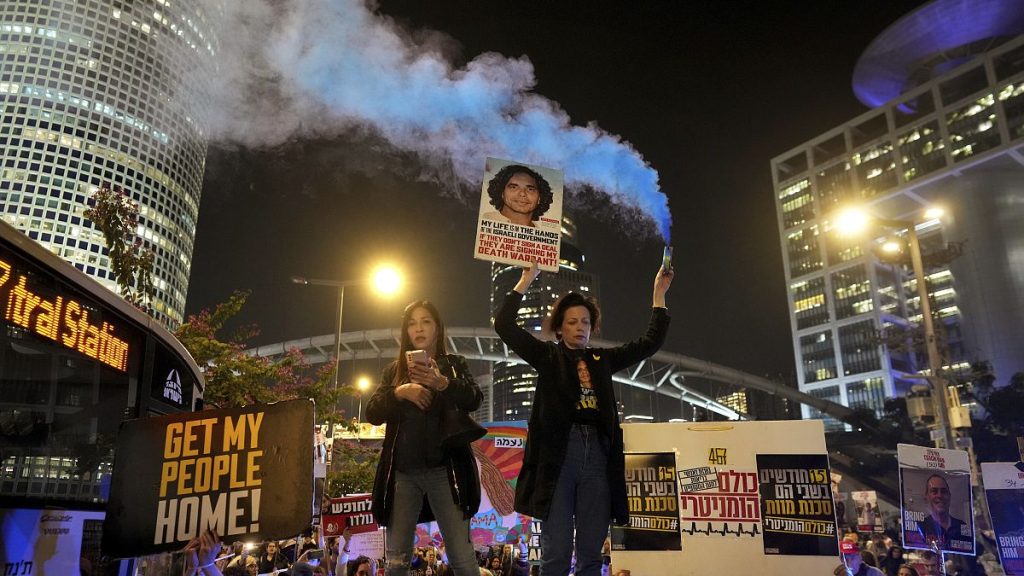The protracted and devastating conflict between Israel and Hamas has reached a pivotal moment with the Israeli cabinet’s approval of a ceasefire agreement. This hard-won truce, mediated by Qatar and the United States, marks the second attempt at cessation of hostilities during this 15-month war, the deadliest and most destructive in the history of the conflict. The agreement, initially announced on Wednesday, faced delays attributed to last-minute complications cited by Prime Minister Benjamin Netanyahu, who placed the blame on Hamas. The ceasefire is scheduled to commence on Sunday, signaling a fragile hope for an end to the bloodshed that has claimed tens of thousands of lives and displaced countless others. However, uncertainties linger, notably regarding the identities and status of the 33 hostages slated for release in the initial six-week phase of the agreement.
The Israeli cabinet’s decision to convene well into the Jewish Sabbath underscores the gravity of the situation. This extraordinary measure, deviating from the customary observance of the Sabbath, reflects the critical nature of the ceasefire agreement. Prime Minister Netanyahu, acknowledging the significance of the hostage release, has established a dedicated task force to facilitate their return and has ensured that their families have been informed of the agreement. The ceasefire provisions extend beyond the hostage release, encompassing the liberation of hundreds of Palestinian detainees from Israeli prisons and a substantial influx of humanitarian aid into the ravaged Gaza Strip. The Israeli Justice Ministry has released a preliminary list of 95 Palestinian prisoners eligible for release in the first phase, specifying that the releases will not commence before 4 pm local time on Sunday and that all individuals on the list are either female or minors.
In a departure from the previous ceasefire, the Israeli Prison Services will handle the transportation of the released prisoners, replacing the International Committee of the Red Cross, in an effort to minimize public displays of celebration. The prisoners slated for release face charges ranging from incitement and vandalism to supporting terrorism, terrorist activities, attempted murder, and throwing stones or Molotov cocktails. Concurrently, a fleet of trucks laden with humanitarian aid has been stationed at the Rafah border crossing, awaiting entry into Gaza. Egyptian authorities have confirmed the arrival of an Israeli delegation, comprising military and Shin Bet personnel, to Cairo to coordinate the reopening of the Rafah crossing. This coordinated effort underscores the commitment to facilitating the flow of essential supplies into the besieged territory.
The phased approach to the ceasefire includes the gradual withdrawal of Israeli forces from designated areas within Gaza, enabling hundreds of thousands of displaced Palestinians to return to their homes, albeit in many cases, to ruins. The Israeli military has emphasized that while residents will be permitted to return to certain areas, access to locations where troops remain or near the border will be restricted. Any actions perceived as threats to Israeli forces will be met with a decisive response. This cautious approach reflects the delicate balance between facilitating the return of displaced populations and maintaining security in a volatile environment.
Underlying the ceasefire agreement are fundamental disagreements that pose significant challenges to a lasting peace. Hamas demands a permanent ceasefire and a complete Israeli withdrawal as preconditions for the release of the remaining hostages. Conversely, Israel remains committed to dismantling Hamas and maintaining its security control over the territory, vowing to continue fighting until these objectives are achieved. These diametrically opposed positions highlight the deep-seated mistrust and the formidable obstacles that must be overcome to secure a sustainable peace. The current ceasefire, while a welcome respite from violence, represents a fragile and potentially temporary reprieve in a conflict marked by deep-rooted animosity and intractable differences.
The current conflict, ignited by Hamas’s cross-border attack into Israel in October 2023, has resulted in a staggering loss of life and widespread destruction. Over 1,200 Israelis were killed and 250 taken hostage during the initial assault. Israel’s subsequent offensive has claimed the lives of more than 46,000 Palestinians, according to local health officials. These figures, which do not distinguish between combatants and civilians, paint a grim picture of the devastating human toll of this protracted conflict. The disproportionate number of Palestinian casualties, including a significant proportion of women and children, has drawn international condemnation and sparked global protests. The conflict has also exacerbated regional instability and exposed deep political divisions within Israel, particularly within Prime Minister Netanyahu’s far-right coalition government. The resignation threat by National Security Minister Itamar Ben-Gvir over the ceasefire agreement exemplifies the internal political pressures facing the Israeli government in navigating this complex and volatile situation.














